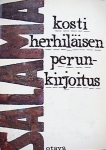Some media and social criticism from the independent left
| Jin Jung-gwon is an Aesthetics scholar, society and media critic and sometime political debater, independent leftist, whose often satiric, funny and offensive texts I've every now and then enjoyed reading. He campaigned for the Democratic Labor Party before the elections, but has since pretty much stopped activities on that front. He used to write for Hankyoreh and sometimes also for Ohmynews, but his and these two medias' view on the government were too different for him to continue. Now that he has been contributing to both Joongang and Donga, president Noh and Uri Pary supporters' view of him cannot have improved... He has recently contributed a column for Joongang Monthly, which makes good and interesting reading in its requests for common sense and common ground in the political and social debate in Korea. I've translated just a couple of excerpts. Yet another example: there were many people who mourned over the death of Misun and Hyosun in an accident with a US army vehicle.If one is a sensitive humanist, expressing grief over the death of unknown schoolgirls, then one should also have expressed grief over the young men who lost their lives in the shelling by the North Koreans in the Western Sea hostilities. If someone was criticizing the unresponsible attitude of the US army, the same person should also have raised his voice against the hazardous line of North Korea, which opened fire without any apparent reason. When my writing which criticized MBC's program "Sin Kang-gyun's Actually" appeared, the attack from "our side's" begun immediately. Ohmynews published an article which declared that "the responsibility of an intellectual in the Republic of Korea is to not get taken advantage of by Chosun Ilbo." I was stunned speechless. "The one that acts advantageously for the enemy shall be punished." What's different from this definition of an "enemy-benefitting organization" from the National Security Law. What is to be done if one is not allowed to benefit the enemy? Naturally one should keep one's mouth shut about the wrongs on one's own side. Here I see a kind of a power in action here (여기서 나는 어떤 권력의 작동을 본다). In a society divided this way into to groups, the one who sees faults simultaneously in both media has no place to stand, and is forced to take sides. "The encampment mentality" of Koreans does not stem from stupidity. People have learned what kind of a retribution follows from not belonging definitely to a particular camp. The media movement, begun with the "Anti-Chosun", has had many successes. Chosun Ilbo has become the laughinstock of the society, which was even pointed out by the labor union of Sports Chosun. But has the level of the media improved now that the influence of Chosun Ilbo has diminished? I have the feeling that the ills of partisan journalism have gotten actually worse. Even if there's been success in curtailing Chosun Ilbo, creating a new media paradigm has failed. Categories at del.icio.us/hunjang: media ∙ Koreanpolitics |

